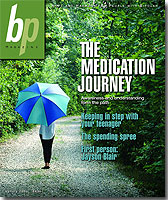The Medication Journey: Bipolar Medication Adherence
Adherence is an issue that confronts anyone working to manage a difficult medical condition like bipolar disorder. bp Magazine investigates the unique challenges faced by those with mental illness and offers insight for those facing the medication journey.
 Peter Newman spent his youth in Birmingham, England and got what he calls "a quite nice telecom job in London." He had his first depressive episode at age 17 and was finally diagnosed with bipolar disorder at age 25. During a particularly acute manic episode, he applied to a Cambridge PhD program and was rather surprised to find himself accepted.
Peter Newman spent his youth in Birmingham, England and got what he calls "a quite nice telecom job in London." He had his first depressive episode at age 17 and was finally diagnosed with bipolar disorder at age 25. During a particularly acute manic episode, he applied to a Cambridge PhD program and was rather surprised to find himself accepted.
Today, almost 50, Peter Newman, PhD, works as a software engineer in Silicon Valley, enjoying long periods of health, stability, and clarity. These are interrupted unpredictably by episodes of illness, mostly manic ones.
Looking back at the course of his up-and-down existence, Peter says, "I have been taking prophylactic medication for over 20 years. I've had episodes during this time. I had my doubts about the efficacy of the medication, but I kept taking it. Recently, when I changed my medical insurance, there was a period when I could not obtain the medication. I doubt it was just a coincidence that my first episode in eight years occurred while I was not taking the tablets. I should have paid for the medication myself and claimed it back on the insurance later."
Taking drugs doesn't seem natural
For various reasons, "it's the nature of people not to adhere to medical treatment. People with any condition are in general better at not adhering rather than adhering," explains Michael E. Thase, MD, professor of psychiatry at the University of Pittsburgh School of Medicine. However, mental illnesses pose special adherence challenges, explains Dr. Thase, making a point voiced by many experts. "You don't want to be mentally ill and have to take annoying treatments. You want this [problematic behavior and emotional state] to just be your personality what is unique and idiosyncratic about you. This is how bipolar disease differs from heart disease or ulcers. When you have ulcers, you don't have to come to sense who you are as involving having an erosion in your stomach."
And just as an ulcer patient may need to be careful about diet and other lifestyle choices as well as taking medicine, so must a person living with bipolar look at his or her treatment in broad terms. Careful use of medication coupled with a sound diet, regular exercise, and plenty of sleep all contribute greatly to the best health for those affected.
Finding self-awareness
Solid new research has shown that in someone diagnosed, physical changes in the brain hamper that person's ability to fathom the truth of his or her own situation. In other words, the brain dysfunction that is part of bipolar itself often impairs the development of insight or self-awareness concerning the disorder and how best to cope. For relatives of a consumer, this fact can be of critical importance when they offer help. "When you face the frustration of trying to convince a loved one to get or to adhere to treatment, urges Xavier Amador, PhD, remember that the enemy is brain dysfunction, not the person"a point he underscores in his book, I Am Not Sick, I Don't Need Help: Helping the Seriously Mentally Ill Accept Treatment: Practical Guide for Families and Therapists.
Dr. Amador says that ample research has shown that vigilant adherence is key for the best health outcomes. "It's always been clear that consistent treatment is critical in the prevention of suicide, violence, and all sorts of dangerous behaviors," he says. "What had not been clear until quite recently is the huge positive effect that early, ongoing treatment has on the lifetime course of this illness. Whenever someone with serious mental illness has another episode, the long-term outlook for them gets worse. When you can intervene early and limit the number of full-blown psychotic episodes that a person has, he will have much better health and a much higher level of functioning later on in life." Many scientists believe that psychotic episodes are toxic to the brain; Dr. Amador says that there is a great deal of indirect evidence to bolster this notion.
Understanding means doing better
Experts differ on the exact extent of the bipolar medication nonadherence problem, but agree that it is significant. "Most studies find that about half of the people with serious mental illness don't take their medication," says Dr. Amador. Charles Bowden, MD, cites somewhat more encouraging numbers, stating that most studies find "the range of people [living with bipolar] who are in poor compliance to be in the range of 25 percent to 40 percent." He serves as a professor of psychiatry and pharmacology at the University of Texas Health Science Center.
Experts do agree that good understanding about bipolar disorder promotes adherence. Dr. Amador says that a consistent finding among most studies is that the more aware a seriously mentally ill person is of his or her illness and of the benefits they can gain from treatment the better they will do. Research he has done with colleagues has shown that the two crucial aspects of insight that promote good adherence and good outcomes are:
- awareness of certain early warning signs of deterioration, and
- understanding of the benefits of treatment.
Still, learning to deal with bipolar can prove hard and that's understandable, says Dr. Bowden, when you consider that both the disorder itself and the means to treat it are quite complex. He explains: "This condition is multifaceted. It's not something you can learn enough about through ten minutes of reading, or looking on the Internet." Understanding bipolar can prove especially hard both for consumers and their loved ones, because its very nature often involves long stable periods interrupted by spells of illness. The range of treatment options struck Peter Newman as an important hurdle: "Everybody responds differently," he says. "Some stuff works for some people. Some stuff works for others."
Consumers often think of their disorder as something that comes and goes, and both the medical experts and others contacted for this article agreed. So a person may acknowledge the disorder during an episode, but decide after things improve that they no longer need medicine. Such people "treat their medications like antibiotics," says Dr. Amador. "When the bottle is empty, they think they are cured." A better comparison, he explains, would be to think of bipolar medications as insulin is for diabetics—something needed on a constant basis. For family members, too, it's tempting to think that when a person diagnosed as bipolar has stabilized, the problem has gone away. Dr. Amador calls this tendency among healthy relatives their own form of denial.
She did what needed to be done
Jacqueline Mahrley, 39, lives in Anaheim, California, and works part time as a home health aide. She also works closely with the Depression and Bipolar Support Alliance (DBSA). Jacqueline became mentally ill as a teenager, but wasn't correctly diagnosed as having bipolar disorder until she was 28. "That diagnosis changed my life—the medication worked and all of a sudden my life had meaning that it had been lacking," she says.
Despite her relief at finally obtaining a sound diagnosis, she fell into the common trap described by Dr. Amador. As Jacqueline explains, "Basically when you are feeling well you don't want to take medicine and I have had to learn to overcome that."
Although she was only nonadherent once or twice, Jacqueline says the impact was huge. "I've lost a lot going off the medication. The worst consequence for me was that my child wanted nothing to do with me. I have this one son and he is my life. And I lost custody of him through being sick. It happened five or six years ago when I went off my medicine and I can say with complete confidence that I will never do that again."
Jacqueline's mother, with whom she is close, won custody of the boy (who is now grown). Jacqueline's regimen involves numerous drugs. "I take a lot of pills but they work," she says, "and I'm lucky not to have a lot of side effects." She saw five or six psychiatrists before finding a doctor who acts as a true partner in her care. "When I finally found a doctor I could really trust and I knew he had my best interests at heart, it wasn't hard for me to do what he wanted me to do," she says.
While Jacqueline did not experience many side effects, many others suffer keenly from them. When this occurs, Dr. Bowden encourages consumers to persevere and work with their doctors to get the drug plan right. "You can have both sanity and a life that is not badly encumbered" by awful side effects or "medically jeopardized" by potentially severe ones, says Dr. Bowden. Finding such a winning combination of medicines may require "a doctor who is patient and committed," he says, but it can be done.
Medical and non-medical people interviewed for this article pointed out that beyond side effects, practical matters, too, can impact adherence. People give up because of insurance problems (as did Peter Newman), cost, and exasperation over taking many different medicines. The experts advise that if you have problems like these, discuss them with your doctor, a practical-minded loved one, or both. Just don't stop taking your medicines. Work toward a drug program you can afford and comfortably manage.
Living a healthy lifestyle
Staying with the program means much more than reliable use of drugs. "Although most discussions of the issue do center on medicine," Dr. Bowden says, "lifestyle issues can be equally important [in matters of adherence. Factors such as] what the person is drinking or consuming in terms of other substances ... and how much they are sleeping make a huge difference. There is a positive side to this discussion because bipolar is a condition that is to a substantial degree under the patient's control. This reflects the importance of the person being willing to live a healthy life, beyond whether he or she is simply taking the bipolar medication."
The global nature of medication adherence, says Dr. Bowden, represents a common theme regarding bipolar management among the most up-to-date, best-informed mental health practitioners. It is a theme heard less often, he says, in "a financially strapped public sector program because this [aspect of management] does take some time."
Everyone controls his or her own wellness
Psychiatrists and psychologists, who are knowledgeable about bipolar medication adherence, stress that consumers must learn to understand these issues, because they are so squarely within each individual's control. They agree about the value in choosing healthy foods, being very prudent with caffeine and alcohol, avoiding recreational drugs, and eating meals and exercising at regular hours. Dr. Thase cautions against workouts late in the day, which can be overstimulating. He and other physicians and therapists strongly emphasize the need for enough sleep each night. "If your normal is seven or eight hours, get it," he says. "If it's nine hours for you, get nine." Sensible lifestyle steps such as these can matter greatly in staying healthy. Difficulty in maintaining these healthy habits can also provide warning signs, especially with regard to sleep. "Adequacy of sleep is a sine qua non for doing well," Dr. Bowden says.
Peter Newman learned directly that when he started having trouble falling asleep at night, he was teetering at the edge of a manic episode. "I know that the biggest problem with mania is loss of sleep," he says, "If I'm heading into a second night without sleep, it's time for me to hit the sleeping tablets, benzodiazepine. I have enough experience now to know what it feels like [to start becoming seriously ill] and enough motivation to know that I do not want this manic holiday. I could bring on an episode by staying up for several nights and getting overexcited. But I have staved them off."
Peter has done more than ward off his "manic holidays." He's decided to "always do what the doctor tells me. "My main reason for taking the medications is to keep the doctor happy. You want a happy doctor. You don't want to piss off the doctor because you need him. You figure this out after a few bad episodes. I shall keep taking the tablets, probably for ever and ever. Amen."
Peter developed a very deep and worthwhile Web site where he shares with others the wisdom learned following his path "to survival with bipolar." Visit www.lucidinterval.org for a sample of his insight.
Milly Dawson writes about health, parenting, and business topics for major magazines and newspapers including The New York Times, Newsweek, Good Housekeeping and Cosmopolitan.
next: Brain Damage From Bipolar Disorder
~ bipolar disorder library
~ all bipolar disorder articles
APA Reference
Staff, H.
(2007, February 2). The Medication Journey: Bipolar Medication Adherence, HealthyPlace. Retrieved
on 2026, February 27 from https://www.healthyplace.com/bipolar-disorder/articles/bipolar-medication-adherence



